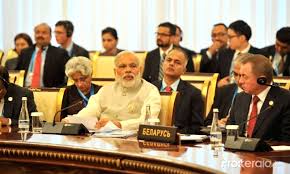 The ball for the expansion of the Shanghai Cooperation Organization (SCO) was set rolling at its Summit in Ufa, Russia, in July 2015, with the acceptance of applications by India and Pakistan. The process was taken forward at the recent Summit in Tashkent, Uzbekistan on 23-24 June, with the two countries signing the SCO’s ”Memorandum of Obligations”. Over the coming year India will sign around 30 documents, and join as a full Member at the next Summit in Astana, Kazakhstan in June 2017.
The ball for the expansion of the Shanghai Cooperation Organization (SCO) was set rolling at its Summit in Ufa, Russia, in July 2015, with the acceptance of applications by India and Pakistan. The process was taken forward at the recent Summit in Tashkent, Uzbekistan on 23-24 June, with the two countries signing the SCO’s ”Memorandum of Obligations”. Over the coming year India will sign around 30 documents, and join as a full Member at the next Summit in Astana, Kazakhstan in June 2017.
Since its establishment, the SCO has concluded several wide-ranging agreements on security, trade and investment, connectivity, energy, SCO Bank, culture, etc. Their implementation has, however, remained uninspiring. This is partly because SCO lacks coherence. Having been created at China’s behest with Russian support, the SCO is still struggling to evolve as a well-knit entity. Nevertheless, its significance cannot be underestimated because it straddles large territorial, geo-political, strategic and economic space and strength.
Challenges and Opportunities
India’s membership in the SCO will add significant heft and muscle to the Organization particularly in the backdrop of the anaemic international economy. India is the fastest expanding major global economy today, with annual GDP growth of 7.5 per cent. It represents the third largest economy (USD 8 trillion) in PPP terms and the seventh largest (USD 2.3 trillion) in nominal dollar terms. It inspires confidence on other indicators like FDI, inward remittances, savings rate, pace of economic reforms, etc. Its large market, favourable demographics and technological prowess augur well for the other economies of the grouping. Its growing energy demand promises an assured market to resource rich (oil, gas, uranium, coal) Central Asia and Russia.
SCO will need to assume responsibility for providing security in Afghanistan in the aftermath of the withdrawal of US and NATO ISAF forces. India will be able to play its due role in stabilizing the situation in Afghanistan which is assuming disturbing proportions due to the Taliban’s increasing attacks.
Terrorism and radicalism are the most formidable challenges confronting the region and international community today. India has been a victim of terrorist attacks for the last 30 years. Battling with terrorism has provided invaluable perspicacity to the Indian security establishment in intelligence gathering, training, foiling terrorist operations, etc. The threat of terrorism to the SCO region is particularly grave on account of continuing violence in Afghanistan, which can embolden regional groups like the Islamic Movement of Uzbekistan, Hizb-ut-Tahrir, etc. to destabilize governments in Central Asia.
The scourge of radicalism also looms large over the region with the expanding influence of the Islamic State (IS) and the reported desertion of several members of the Taliban, Al Qaeda, etc. to join the IS ranks. Several hundred young men and women have fled their homes in Central Asia to bolster IS forces that are spreading to Central Asia, Pakistan and Afghanistan.
India can share its experience of handling the twin scourges of terrorism and radicalism with SCO members to mutual benefit. India can also enhance its engagement with the Regional Anti-Terrorist Structure (RATS) based in Tashkent, Uzbekistan.
Connectivity
Central Asia is part of India’s extended neighbourhood. But India and Central Asian countries have failed to realize the immense potential in promoting security, political, economic, trade, investment, energy ties because of the lack of common land borders. Another reason is the lack of frequent visits at the highest level to Central Asian States. SCO membership will provide a welcome opportunity for Indian Prime Ministers to meet the Presidents of Central Asian States regularly and frequently. India’s potential participation in the Eurasian Economic Union (EEU) will add further value to the partnership.
To obviate the lack of direct land connectivity with Central Asia, and Pakistan’s refusal to provide access through its territory, India is actively collaborating to develop the Iranian seaport of Chabahar with possible financial and technical support from Japan. The agreement to develop Chabahar and associated rail-network at a cost of USD 500 million was signed by Prime Minister Modi with the Presidents of Iran and Afghanistan during his recent visit to Iran. India has also prioritized the construction of the International North-South Transport Corridor.
Central Asia represents the ‘’near-abroad’’ for Russia. Both India and Russia can collaborate for reciprocal benefit in several areas including agriculture, SMEs, pharmaceuticals, IT, etc. India has demonstrated its determination to strengthen its multi-faceted relations with Central Asia through Modi’s historic visit to the five Central Asian Republics in July 2015. Several Agreements were signed. The Turkmenistan, Afghanistan, Pakistan, India (TAPI) gas pipeline whose construction commenced in December 2015, is a bright example of a mutually beneficial project.
Conclusion
Some commentators have expressed concern that the induction of India and Pakistan could shift the focus of SCO from Central Asia to South Asia and could disrupt the SCO’s smooth and consensual functioning through an emphasis on India-Pakistan bilateral disputes. This appears highly unlikely. India’s only objective is to engage with SCO members to promote peace, security, connectivity, energy trade, people-to-people contacts and economic development in the region.
Some Chinese analysts opine that the membership of India and Pakistan will provide a role for the SCO to mediate in their disputes. The argument advanced is that the SCO’s predecessor, the Shanghai Five, was established to demarcate boundaries between its member states. It successfully achieved this. This appears to be wishful thinking. India has made it abundantly clear that there is no role for third-party mediation in India-Pakistan conflict. A resolution is possible only when Pakistan stops using terrorism as an instrument of state policy.
India’s membership of the SCO is a win-win proposition for the Organization, for Central Asia, for Russia, for China as well as for India. Members will reap huge benefits if they conduct themselves with responsibility.
Courtesy: IDSA
Author Profile
- India Writes Network (www.indiawrites.org) is an emerging think tank and a media-publishing company focused on international affairs & the India Story. Centre for Global India Insights is the research arm of India Writes Network. To subscribe to India and the World, write to editor@indiawrites.org. A venture of TGII Media Private Limited, a leading media, publishing and consultancy company, IWN has carved a niche for balanced and exhaustive reporting and analysis of international affairs. Eminent personalities, politicians, diplomats, authors, strategy gurus and news-makers have contributed to India Writes Network, as also “India and the World,” a magazine focused on global affairs.
Latest entries
 In ConversationJuly 26, 2024India-Italy defence collaboration can extend to third countries: Anil Wadhwa
In ConversationJuly 26, 2024India-Italy defence collaboration can extend to third countries: Anil Wadhwa In ConversationJuly 23, 2024Italy views India as a key partner in Indo-Pacific: Vani Rao
In ConversationJuly 23, 2024Italy views India as a key partner in Indo-Pacific: Vani Rao DiplomacyJune 29, 2024First BRICS unveils a roadmap for boosting tourism among emerging economies
DiplomacyJune 29, 2024First BRICS unveils a roadmap for boosting tourism among emerging economies India and the WorldJune 11, 2024On Day 1, Jaishankar focuses on resolving standoff with China
India and the WorldJune 11, 2024On Day 1, Jaishankar focuses on resolving standoff with China






